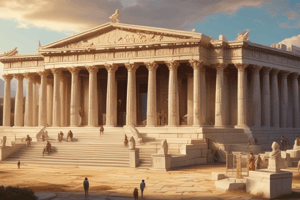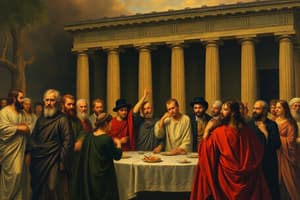Podcast
Questions and Answers
What significant action did the Magna Carta achieve regarding the power of the king?
What significant action did the Magna Carta achieve regarding the power of the king?
- It established a monarchy with unlimited power.
- It required the king to follow the same laws as the people. (correct)
- It allowed the king to make arbitrary decisions.
- It abolished the need for laws altogether.
What role does Parliament serve in a democratic system?
What role does Parliament serve in a democratic system?
- It acts as a single entity with no elected members.
- It is a body of appointed officials who decide laws.
- It consists of elected representatives who help make laws. (correct)
- It is primarily responsible for enforcing laws.
What does the Social Contract imply about the relationship between government and individuals?
What does the Social Contract imply about the relationship between government and individuals?
- People give up all rights for government protection.
- There is a mutual agreement for rules in exchange for protection. (correct)
- Governments have absolute power over individuals.
- Individuals should obey the government unconditionally.
What is a major concern highlighted by figures like Mary Wollstonecraft regarding rights?
What is a major concern highlighted by figures like Mary Wollstonecraft regarding rights?
What was John Locke's view on the source of a ruler's power?
What was John Locke's view on the source of a ruler's power?
How did the principles of separation of powers benefit a democratic government?
How did the principles of separation of powers benefit a democratic government?
What issue caused conflict between James I and Parliament?
What issue caused conflict between James I and Parliament?
What prompted Parliament to restore the monarchy?
What prompted Parliament to restore the monarchy?
What is the primary function of government in relation to democracy?
What is the primary function of government in relation to democracy?
Which aspect differentiates indirect democracy from direct democracy?
Which aspect differentiates indirect democracy from direct democracy?
Which historical figure is considered the founder of Athenian democracy?
Which historical figure is considered the founder of Athenian democracy?
How did the Judeo-Christian tradition contribute to democratic principles?
How did the Judeo-Christian tradition contribute to democratic principles?
What influence did the Renaissance have on democratic ideas?
What influence did the Renaissance have on democratic ideas?
What was a major teaching of the Prophets regarding justice?
What was a major teaching of the Prophets regarding justice?
How did early Christian ideas spread throughout the Roman Empire?
How did early Christian ideas spread throughout the Roman Empire?
Which statement is true regarding the Reformation's impact on democracy?
Which statement is true regarding the Reformation's impact on democracy?
Flashcards are hidden until you start studying
Study Notes
Ancient Greece and Rome's Contribution to Democracy
- Government organizes decision-making processes and enables public participation in governance.
- Direct democracy allows citizens to vote directly on laws and issues.
- Republic signifies a system where elected representatives make decisions on behalf of the populace.
- Cleisthenes established Athenian democracy around 508-507 BCE; his reforms expanded voting rights and public involvement in governance.
- Indirect democracy involves electing representatives, while direct democracy involves citizens voting on policies themselves.
Judeo-Christian Tradition and Democracy
- Judaism promotes principles of fairness and equality, foundational to democratic societies.
- Christianity advocates for the belief in equal rights for all individuals, supporting democratic ideals.
- Islam emphasizes fairness and community involvement in decision-making, paralleling democratic practices.
- The Renaissance revived concepts of individual rights and collective decision-making, influencing modern democratic frameworks.
- The Reformation questioned traditional authority, championing individual freedom, which contributed to democratic thoughts.
Teachings and Spread of Judeo-Christian Ideas
- Prophets emphasized the immorality of injustice and oppression, advocating for fairness and support for the vulnerable.
- Early Christian missionaries disseminated Judeo-Christian ideas across the Roman Empire through travel and community engagement.
Renaissance and Reformation's Impact on Democracy
- These movements rekindled interest in personal rights and challenged established power structures, fostering the development of democratic concepts.
Development of Democracy in England
- The Magna Carta curtailed royal authority, asserting that the king is subject to the law.
- Parliament consists of elected representatives responsible for lawmaking and governance.
- The Bill of Rights safeguards individual freedoms and restricts governmental power.
- The principle of rule by law ensures the king adheres to the same legal standards as citizens, preventing arbitrary actions.
Conflict Between James I and Parliament
- James I sought total authority while Parliament aimed for shared governance, leading to clashes over power distribution.
Restoration of Monarchy
- Parliament reinstated the monarchy to restore stability, conceding to limited royal powers.
The Enlightenment's Influence on Democracy
- The social contract posits that citizens accept certain regulations in exchange for governmental protection and fairness.
- Natural rights encompass fundamental freedoms, such as life and liberty, crucial for democratic societies.
- Separation of powers is a governance model that distributes authority among branches to prevent any entity from becoming too powerful.
- Mary Wollstonecraft championed women's rights, underscoring the notion that all individuals deserve equal treatment.
John Locke on the Divine Right of Kings
- Locke argued that a ruler's legitimacy arises from the consent of the governed rather than a divine mandate.
Education's Role in Equality
- Both Astell and Wollstonecraft advocated for accessible education, believing it is vital for achieving equality and empowering individuals.
Studying That Suits You
Use AI to generate personalized quizzes and flashcards to suit your learning preferences.




